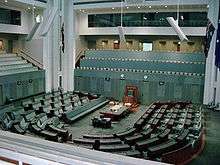Lower house
| Legislature |
|---|
| Chambers |
| Parliament |
| Parliamentary procedure |
| Types |
| Legislatures by country |
A lower house is one of two chambers of a bicameral legislature, the other chamber being the upper house.[1]

Inside the Australian House of Representatives
Despite its official position "below" the upper house, in many legislatures worldwide, the lower house has come to wield more power. A legislature composed of only one house is described as unicameral.
Common attributes
In comparison with the upper house, lower houses frequently display certain characteristics:
- Powers
- In a parliamentary system:
- Much more power, usually based on restrictions against the upper house.
- Able to override the upper house in some ways.
- Can vote a motion of no confidence against the government.
- Exceptions are Australia, where the Senate has considerable power approximate to that of the House of Representatives, and Italy, where the Senate has exactly the same powers as the Chamber of Deputies.
- In a presidential system:
- Somewhat less power, as the upper house alone gives advice and consent to some executives decisions (e..g. appointments).
- Given the sole power to impeach the executive (the upper house then tries the impeachment)
- Frequently, bills to raise revenue and to appropriate funds must originate in the lower house.
- Status
- Always elected directly, while the upper house may be elected directly, indirectly, or not elected at all.
- Its members may be elected with a different voting system to the upper house.
- Most populated administrative divisions are better represented than in the upper house; representation is usually proportional to population.
- Elected more frequently.
- Elected all at once, not by staggered terms.
- In a parliamentary system, can be dissolved by the executive.
- More members.
- Has total or original control over budget and monetary laws.
- Lower age of candidacy than the upper house.
Titles of lower houses
Common names

Dáil Éireann, Republic of Ireland
Many lower houses are named in the following manner: House/Chamber of Representatives/the People/Commons/Deputies.
- Chamber of Deputies
- Chamber of Representatives
- House of Assembly
- House of Representatives
- House of Commons
- House of Delegates
- Legislative Assembly
- National Assembly
Unique Names
- Camera dei Deputati Chamber of Deputies (Italy)
- Lok Sabha House of the People (India)
- Dewan Perwakilan Rakyat People's Representative Council (Indonesia)
- Dáil Éireann Assembly of Ireland (Ireland)
- Dewan Rakyat People's Hall (Malaysia)
- Congreso de los Diputados Congress of Deputies (Spain)
- Mazhilis Assembly (Kazakhstan)
- House of Keys (Isle of Man)
- Sejm (Republic of Poland) (not to be confused with the Great Sejm)
- State Duma (Russia)
- Tweede Kamer Second Chamber (Netherlands)
- Bundestag Federal Diet (Germany)
- Pyithu Hluttaw House of Representatives (Myanmar)[2]
- Βουλή των Ελλήνων Council of the Hellenes (Greece)
See also
References
- ↑ Bicameralism (1997) by George Tsebelis
- ↑ "http://www.pyithuhluttaw.gov.mm/". www.pyithuhluttaw.gov.mm. Retrieved 2016-03-02. External link in
|title=(help)
This article is issued from
Wikipedia.
The text is licensed under Creative Commons - Attribution - Sharealike.
Additional terms may apply for the media files.